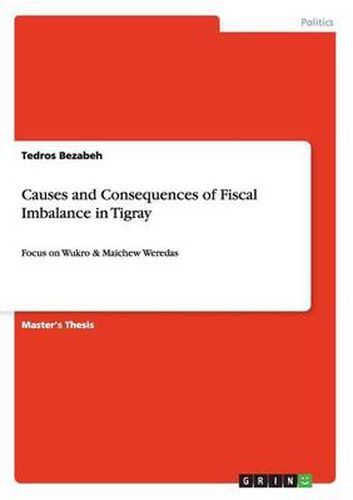Readings Newsletter
Become a Readings Member to make your shopping experience even easier.
Sign in or sign up for free!
You’re not far away from qualifying for FREE standard shipping within Australia
You’ve qualified for FREE standard shipping within Australia
The cart is loading…






Master’s Thesis from the year 2012 in the subject Politics - International Politics - Topic: Miscellaneous, grade: Very Good, course: Master’s Thesis, language: English, abstract: Decentralization refers to division of multidimensional power between the center and sub national governments. Fiscal decentralization is core component of decentralization that gives an autonomous authority to local governments a revenue and expenditure assignments. Though fiscal decentralization has given revenue raising and spending decision powers to lower levels of government, the implementation process has often been a discouraging task for many local authorities in the developing world. In the case of Ethiopia, decentralization has been implemented since 1991. However, vertical as well as horizontal fiscal imbalance still persists at different layers of government. Therefore the core objective of this paper is to assess the causes and consequences of fiscal imbalance in Tigray, focus on Wukro & Maichew. In order to collect the required data, both primary and secondary sources are used. In addition with this, the research also applies qualitative approach and using case study design. Accordingly, at region level, the region only covers 29% of its total expenditure in the last six years. In line with this, Wukro and Maichew Wereda are among the Weredas in Tigray which faces the problem of fiscal imbalance. While Wukro Wereda covers 14.5% of its total expenditure from internal revenue and Maichew only covers only 11.3% of its expenditure. Poor revenue assignment, huge expenditure responsibility, geographical and topographic characteristics and inadequate capacity building activities to raise revenue in the study areas are the causes of fiscal imbalance in the study areas. Restricting expenditure opportunity, affecting service delivery and causes incomplete plan are the major negative implication of fiscal imbalance in the study areas. Accordingly, extending the revenue authority
$9.00 standard shipping within Australia
FREE standard shipping within Australia for orders over $100.00
Express & International shipping calculated at checkout
Master’s Thesis from the year 2012 in the subject Politics - International Politics - Topic: Miscellaneous, grade: Very Good, course: Master’s Thesis, language: English, abstract: Decentralization refers to division of multidimensional power between the center and sub national governments. Fiscal decentralization is core component of decentralization that gives an autonomous authority to local governments a revenue and expenditure assignments. Though fiscal decentralization has given revenue raising and spending decision powers to lower levels of government, the implementation process has often been a discouraging task for many local authorities in the developing world. In the case of Ethiopia, decentralization has been implemented since 1991. However, vertical as well as horizontal fiscal imbalance still persists at different layers of government. Therefore the core objective of this paper is to assess the causes and consequences of fiscal imbalance in Tigray, focus on Wukro & Maichew. In order to collect the required data, both primary and secondary sources are used. In addition with this, the research also applies qualitative approach and using case study design. Accordingly, at region level, the region only covers 29% of its total expenditure in the last six years. In line with this, Wukro and Maichew Wereda are among the Weredas in Tigray which faces the problem of fiscal imbalance. While Wukro Wereda covers 14.5% of its total expenditure from internal revenue and Maichew only covers only 11.3% of its expenditure. Poor revenue assignment, huge expenditure responsibility, geographical and topographic characteristics and inadequate capacity building activities to raise revenue in the study areas are the causes of fiscal imbalance in the study areas. Restricting expenditure opportunity, affecting service delivery and causes incomplete plan are the major negative implication of fiscal imbalance in the study areas. Accordingly, extending the revenue authority